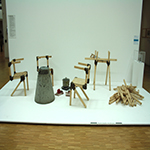Euroacademia Conferences
 Europe Inside-Out: Europe and Europeanness Exposed to Plural Observers (9th Edition) April 24 - 25, 2020
Europe Inside-Out: Europe and Europeanness Exposed to Plural Observers (9th Edition) April 24 - 25, 2020 Identities and Identifications: Politicized Uses of Collective Identities (9th Edition) June 12 - 13, 2020
Identities and Identifications: Politicized Uses of Collective Identities (9th Edition) June 12 - 13, 2020 8th Forum of Critical Studies: Asking Big Questions Again January 24 - 25, 2020
8th Forum of Critical Studies: Asking Big Questions Again January 24 - 25, 2020 Re-Inventing Eastern Europe (7th Edition) December 13 - 14, 2019
Re-Inventing Eastern Europe (7th Edition) December 13 - 14, 2019 The European Union and the Politicization of Europe (8th Edition) October 25 - 26, 2019
The European Union and the Politicization of Europe (8th Edition) October 25 - 26, 2019 Identities and Identifications: Politicized Uses of Collective Identities (8th Edition) June 28 - 29, 2019
Identities and Identifications: Politicized Uses of Collective Identities (8th Edition) June 28 - 29, 2019 The European Union and the Politicization of Europe (7th Edition) January 25 - 26, 2019
The European Union and the Politicization of Europe (7th Edition) January 25 - 26, 2019 7th Forum of Critical Studies: Asking Big Questions Again November 23 - 24, 2018
7th Forum of Critical Studies: Asking Big Questions Again November 23 - 24, 2018 Europe Inside-Out: Europe and Europeanness Exposed to Plural Observers (8th Edition) September 28 - 30, 2018
Europe Inside-Out: Europe and Europeanness Exposed to Plural Observers (8th Edition) September 28 - 30, 2018 Identities and Identifications: Politicized Uses of Collective Identities (7th Edition) June 14 - 15, 2018
Identities and Identifications: Politicized Uses of Collective Identities (7th Edition) June 14 - 15, 2018
From Crisis to Prosperity: Paving the Way to the Future of Europe
-
-

-
Presentation speakers
- Gerhard Eichweber, Silva Plan / Value Group, Switzerland
Many people coincide in the observation: The World is in Crisis. And Europe, rather than being the example lighthouse, which it could be, is also paralyzed. There are more and more voices blaming wrong policies and foreign interests for the never ending problems of their societies. But: do they know the deeper roots of the problem? Do they have the solutions? Democracy is at stake when open societies are in retreat. Does this have its reasons in wrong theories and counterproductive policies?
“Different is better” as the underlying concept of innovation and entrepreneurship helps companies and entire regions out of crisis and towards stable success, economic development full employment, functioning social security, healthy state finances and prosperity for all. Should not – with diversity as the most important, thus, vital element of entrepreneurship and innovation as motors of employment and prosperity – regional, ethnic and cultural dversity rather than convergence be pushed and receive all the attention and funding?
Currently, egalitarian policies of “convergence” prevail over as important EU concepts as “EU-regio”- and “Interreg”-Programmes. What does the recognition of the importance of qualitative aspects and diversity – rather than mere quantitative criteria – mean for Europe’s societies, policies and related communications required? What must change in public understanding of science, economy and democracy, in order to understand and overcome the paralyzing influence of misleading paradigms? How can the increasing repression of diversity, e.g. of human values, attitudes and preferences be stopped and reversed? How can better and positive understanding of the riches of Europe’s internal ethnic and cultural diversity be lead to Europe’s being a “powerhouse” of economic and social examples? How can Europe’s hitherto unseen long period of 70 years of peace be turned into a lighthouse paving the way for its own internal progress and for others, as the pattern of peaceful prosperity to be followed and defended?
By opening the Euroacademia Conference on Europe and Europeanness with a workshop, and by, thus, pro-actively furthering the advantages of Euroacademia’s typical multidisciplinary mix of conference-participants into an experience of reciprocal empowerment, Euroacademia seeks to further open the horizons, role and impact of critical and off-mainstream studies presented.The workshop will be opened with a speech on findings regarding economy and, moreover, on the role of a “culture” of positively dealing with qualitative diversity and distinction. After putting currently prevailing paradigms regarding economy and economic policies, in question, I will highlight, what this can mean as a “categorical imperative” of changing the understanding of what hinders societies in achieving lasting prosperity and peace.
Eventually, by opening the discussion and inviting all participants to add their views on the elements of subtle changes needed to harmonize and strengthen Europe in a non-egalitarian way, in order to become, with its unprecedented example of both prosperity and peace, the example for its parts and for its neighbors and other world regions to strengthen their self-determined independence through prosperity and peace as result of truly sustainable policies.
-
Related Presentations

Redefining the Meaning of Public Sphere: Leaders, Citizens, States
- Dora Papadopoulou

















